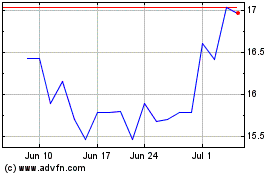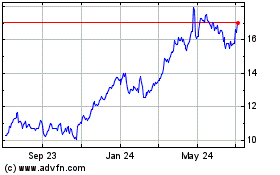ING Chief: New Banking Rules Risk Harming Growth
October 19 2016 - 7:00AM
Dow Jones News
FRANKFURT—Controversial new rules designed to strengthen the
banking sector risk damaging lenders' ability to support the
economy, the head of the Netherlands' largest bank by assets said
Tuesday evening.
The comments underline tensions between Europe and global
regulators only weeks before the new rules are due to be
completed.
Ralph Hamers, chief executive of Dutch bank ING, told a
Frankfurt journalists' club that in some areas, new rules—which
critics refer to as "Basel IV"— would require capital increases.
"The normal reaction of banks is to shrink your balance sheet," he
added.
Such a strategy risked, however, limiting banks' ability to
provide support to eurozone firms and households, especially at a
time when European leaders are pushing on banks to do just
that.
Banks can't help support the economy "if we don't grow as
banks," he said. This scenario isn't "supportive of what Draghi's
trying to do and what Juncker's trying to do," he said, referring
to European Central Bank President Mario Draghi and European
Commission President Jean-Claude Juncker.
Mr. Draghi's institution has for years tried to prod banks to
boost their lending to the real economy via ultracheap loans to
banks and purchases of assets off banks' balance sheets, in the
hope that lenders would pass the new funds to the real economy. Mr.
Juncker has promoted a €315 billion ($346.42 billion) investment
plan to support growth on the continent.
The continent's banks argue that the proposed new rules would
hurt European lenders in competition against American rivals. The
rules are designed to limit banks' ability to calculate the
riskiness of mortgage assets the banks hold.
Unlike their American counterparts, European banks generally
hold mortgage loans on their balance sheets. As a result, they have
to offset more capital against those loans. Despite the objections,
the committee, based in Basel, Switzerland, wants the rules
finalized by the end of the year.
Mr. Hamers, who said his bank is "probably the most pan-European
bank there is", said that more consolidation in the sector would be
good, though he said that it was more likely that this would happen
within countries rather than across borders, since there remain
restrictions on moving funds across borders.
"There is no freedom to move liquidity around. There is no
freedom to move capital around," he said.
Mr. Hamers also cautioned against painting an overly bleak
picture of Germany's banking sector, especially its biggest lender,
Deutsche Bank, which has faced a litany of regulatory trouble in
recent years. "Is it a matter of perception?" he asked, noting that
the bank's capital is stronger than it was during the crisis. "I
wouldn't be so quick saying German banks are weak," he said.
"Deutsche Bank has litigation issues. Italian banks have
nonperforming loans. Every bank has a different story," he
said.
Write to Todd Buell at todd.buell@wsj.com and Hans Bentzien at
hans.bentzien@wsj.com
(END) Dow Jones Newswires
October 19, 2016 06:45 ET (10:45 GMT)
Copyright (c) 2016 Dow Jones & Company, Inc.
Deutsche Bank Aktiengese... (NYSE:DB)
Historical Stock Chart
From Mar 2024 to Apr 2024

Deutsche Bank Aktiengese... (NYSE:DB)
Historical Stock Chart
From Apr 2023 to Apr 2024
